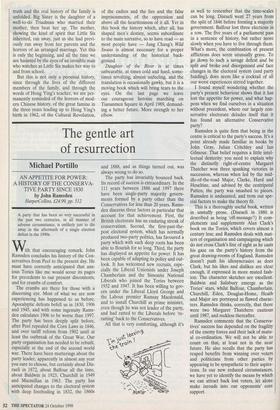The gentle art of resurrection
Michael Portillo
AN APPETITE FOR POWER: A HISTORY OF THE CONSERVA- TIVE PARTY SINCE 1830 by John Ramsden HarperCollins, 124.99, pp. 512
A party that has been so very successful in the past two centuries, in all manner of adverse circumstance, is unlikely just to die away in the aftermath of a single election defeat in the 1990s.
With that encouraging remark, John Ramsden concludes his history of the Con- servatives from Peel to the present day. He must have correctly anticipated that anx- ious Tories like me would scour its pages for precedents to our present discontents, and for crumbs of comfort.
The crumbs are there for those with a discerning eye. Most of what we are now experiencing has happened to us before. Apocalyptic defeats befell us in 1830, 1906 and 1945, and with some ingenuity Rams- den calculates 1906 to be worse than 1997. The party has been deeply split before, after Peel repealed the Corn Laws in 1846, and over tariff reform from 1902 until at least the outbreak of the Great War. Our party organisation has needed to be rebuilt, especially at the end of the second world war. There have been mutterings about the party leader, apparently in almost any year you care to choose, but certainly about Dis- raeli in 1872, about Balfour all the time, about Baldwin in 1923, Churchill in 1949 and Macmillan in 1963. The party has anticipated changes to the electoral system with deep foreboding in 1832, the 1860s and 1888, and as things turned out, was always wrong to do so.
The party has invariably bounced back. Its record of success is extraordinary. In the 111 years between 1886 and 1997 there have been single-party majority govern- ments formed by a party other than the Conservatives for less than 20 years. Rams- den discerns three factors in particular that account for that achievement. First, the British electorate has an enduring streak of conservatism. Second, the first-past-the- post electoral system, which has normally produced two-party politics, has favoured a party which with such deep roots has been able to flourish for so long. Third, the party has displayed an appetite for power. It has been capable of adapting its policy and out- look. It has welcomed new recruits, espe- cially the Liberal Unionists under Joseph Chamberlain and the Simonite National Liberals who joined the Tories between 1932 and 1947. It has been willing to gov- ern under the Liberal Lloyd George and the Labour premier Ramsay Macdonald, and to install Churchill as prime minister, even though he was not leader of the party, and had ratted to the Liberals before 're- ratting' back to the Conservatives.
All that is very comforting, although it's as well to remember that the time-scales can be long. Disraeli went 27 years from the split of 1846 before forming a majority government. Balfour lost three elections in a row. The five years of a parliament pass in a sentence of history, but rather more slowly when you have to live through them. What's more, the combination of present afflictions does seem unusually grave. To go down to such a savage defeat and be split and broke and disorganised and face changes in the electoral system (and party funding), does seem like a cocktail of all our worst experiences stirred together.
I found myself wondering whether the party's present behaviour shows that it has lost the appetite for power, and what hap- pens when we find ourselves in a situation without precedent, where our largely con- servative electorate deludes itself that it has found an alternative Conservative party?
Ramsden is quite firm that being in the centre is critical to the party's success. It's a point already made familiar in books by John Gray, Julian Critchley and Ian Gilmour. That belief requires a little intel- lectual dexterity: you need to explain why the distinctly right-of-centre Margaret Thatcher won three spanking victories in succession, whereas when led by the mid- dle-of-the-road Major, Clarke, Hurd and Heseltine, and advised by the centripetal Patten, the party was smashed to pieces. Ramsden is undaunted, and trots out spe- cial factors to make the theory fit.
This is a thoroughly useful book, written in unstuffy prose. (Disraeli in 1880 is described as being 'off-message) It com- plements and supplements Alan Clark's book on the Tories, which covers almost a century less; and Ramsden deals with mat- ters of organisation and campaigning which do not cross Clark's line of sight as he casts his gaze on the party's history from the great drawing-rooms of England. Ramsden doesn't push his idiosyncrasies as does Clark, but his likes and dislikes are clear enough, if expressed in more muted fash- ion. The character sketches are excellent. Baldwin and Salisbury emerge as the Tories' stars, whilst Balfour, Chamberlain, Churchill, Eden, Douglas-Home, Heath and Major are portrayed as flawed charac- ters. Ramsden thinks, correctly, that there were two Margaret Thatchers: cautious until 1987, and reckless thereafter.
Ramsden comments that the Conserva- tives' success has depended on the fragility of the enemy forces and their lack of mutu- al co-ordination. We will not be able to count on that, at least not in the near future. He also recalls that the party has reaped benefits from winning over voters and politicians from other parties by appearing to be sympathetic to their aspira- tions. In our new reduced circumstances, we have yet to identify the means by which we can attract back lost voters, let alone make inroads into our opponents' core support.


















































































 Previous page
Previous page